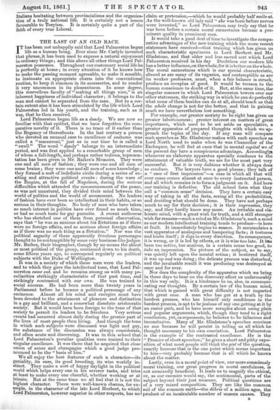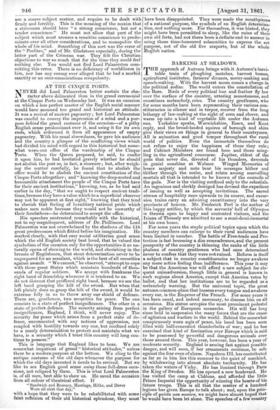LEM LAST OF AN OLD RACE.
TT has been not unhappily said that Lord Palmerston began 1 life as a human being. Ever since Mr. Carlyle invented that phrase, it has been used to express a natural enjoyment in ordinary things; and this above all other things Lord Pal- merston possesses. Throughout our customary social life he is perfectly at home ; in every situation of it he knows how to make the passing moment agreeable to make it sensible, to insinuate an appropriate charm into the conventional routine, to keep it common in its accessories, and to render it very uncommon in its pleasantness. In some degree, this marvellous faculty of "making all things nice," is an inherent happiness of individual character ; it belongs to the man and cannot be separated from the man. But to a cer- tain extent also it has been stimulated by the life which Lord Palmerston led in his youth, and the training, such as it was, that he then received. TT has been not unhappily said that Lord Palmerston began 1 life as a human being. Ever since Mr. Carlyle invented that phrase, it has been used to express a natural enjoyment in ordinary things; and this above all other things Lord Pal- merston possesses. Throughout our customary social life he is perfectly at home ; in every situation of it he knows how to make the passing moment agreeable to make it sensible, to insinuate an appropriate charm into the conventional routine, to keep it common in its accessories, and to render it very uncommon in its pleasantness. In some degree, this marvellous faculty of "making all things nice," is an inherent happiness of individual character ; it belongs to the man and cannot be separated from the man. But to a cer- tain extent also it has been stimulated by the life which Lord Palmerston led in his youth, and the training, such as it was, that he then received. Lord Palmerston began life as a dandy. We are now so familiar with that epithet, that we have forgotten the com- parative novelty of it. There is no trace of it earlier than the Regency or thereabouts. In the last century a person who devoted an unusual care to excellence of costume was called a " maccaroni," just as in our time he is called a "swell." The word "dandy" belongs to an intermediate period, and was first applied to a remarkable group of men of whom a full-length, and perhaps rather tedious' represen- tation has been given in Mr. Raikes's Memoirs. They were one and all men of fashion ; they were one and all men of some brains ; they were one and all men of some knowledge ; they formed a sort of indefinite circle during a series of ex- citing and attractive political events : during the wars of the Empire, at the fall of Napoleon, during the serious difficulties which attended the commencement of the peace, as was not unnatural, they divided their mind between the world of politics and the world of amusement. No leaders of fashion have ever been so intellectual in their habits' or so serious in their thoughts. No body of men who have taken so much interest in politics have ever found so much time, or had so much taste for gay pursuits. A recent authoress who has sketched one of them from personal observation, says that "he was as anxious about his flirtations as if there were no foreign affairs, and as anxious about foreign affairs as if there was no such thing as a flirtation." Nor was the political sagacity of these apparently frivolous personages thought to be contemptible by some very business-like judges. Mr. Raikes, their biographer, though by no means the ablest or most political of the group, continued down to his death, some fifteen years ago, to correspond regularly on political subjects with the Duke of Wellington. It was in a society of which these men were the leaders, and to which they gave the intellectual tone, that Lord Pal- merston came out, and he remains among us with many pe- culiarities strikingly characteristic of that past time, and strikingly contrasted with our own. He was trained to social success. He had been more than twenty years in Parliament before he became a political personage of any eminence. Almost all his mind and energies must have been devoted to the attainment of pleasure and distinction in a gay and brilliant, and a somewhat dissolute aristocratic society. But it would have been foreign to the tone of that society to permit its leaders to be frivolous. Very serious events had occurred almost daily during the greater part of the lives of most people then living. And though the tone in which such subjects were discussed was light and gay, the substance of the discussion was always considerate, and often acute and discerning. It was in this school that Lord Palmerston's peculiar qualities were trained to their singular excellence. It was there that he acquired that close union of sense and champagne which a good judge pro- nounced to be the "basis of him."
We all enjoy the best features of such a character—its geniality, its ease, its good breeding, its wise worldly in- stinct. They make a sort of happy daylight in the political world which helps every one in his severer tasks, and tries at least to make every one cheerful, whether working or at leisure. But at the same time we all feel that it is not the highest character. There were well-known Charms, for ex- ample, in the character of the late Lord Herbert, to which Lord Palmerston, however superior in other respects, has no claim or pretension,—which he would probably half smile at. As the well-known old lady said "she was born before nerves were invented," so Lord Palmerston may truly say that he was born before a certain moral earnestness became a pro- minent quality in prominent men. It would take a good deal of time to investigate the compa- rative advantages of the new training which the more recent statesmen have received—that training which has given us such characteristic specimens in Lord Herbert and Mr. Gladstone, and that older and less sacred sort which Lord Palmerston received in his day Doubtless our modern life has a better influence, on the whole, for it is better on the whole. The moral earnestness which is our special characteristic, absurd as are many of its vagaries, and contemptible as are its weaker professors, must, when a fair balance is struck, produce an overplus of good. It would be treason to the human conscience to doubt of it. But, at the same time, the singular manner in which Lord Palmerston towers over our other statesmen, the striking way in which he can doperfectly what none of them besides can do at all, should teach us that the whole change is not for the better, and that in gaining much we have nevertheless lost something.
For example, our greater anxiety to be right has given us greater laboriousness ; greater interest on matters of great importance, which used to be set aside as speculative, a greater apparatus of prepared thoughts with which we ap- proach the topics of the day. If any man will compare such speeches as Mr. Gladstone makes with such speeches as Lord North used to make when he was Chancellor of the Exchequer, he will feel at once that in mental capital we of the present day have a conspicuous advantage. Accordingly) whenever an elaborate apparatus specially conduces to the attainment of valuable truth, we are for the most part very successful. But it is very dubious whether it always does so conduce. The lawyers have a good phrase ; they talk of a "case of first impression"—a case in which all that will ever come comes almost at once to every instructed person, and all which remains is to form a judgment on it. And here our training is defective. The old school form what they call a "common sense" decision. They have a certain easy way of taking in all the facts, seeing all the probabilities, and deciding what should be done. They have not perhaps much to say for their decision ; it is their impression, they say, and they hardly know any more. An irritable and ela- borate mind, with a great wish for truth, and a still stronger wish for reasons—such a mind as Mr. Gladstone's, such a mind as our modern intellectual training tends to produce—is here at fault. It immediately begins to reason. It accumulates a vast apparatus of analogous and hampering facts; it tortures and hurts itself; it digs in every direction. In consequence, it is wrong, or it is led by others, or it is wise too late. It hits been too active, too anxious, in a certain sense too good, to take an impression. No picture of the subject, so to say, was quietly left upon the mental retina ; it bestirred itself, it was up and was doing ; the delicate process was disturbed, and the invaluable result it was producing was destroyed at once and for ever.
Nor does the complexity of the apparatus which we bring in these days to bear on the discovery affect us unfavourably in this way only. It is a hindrance to us, also, in communi- cating our thoughts. By a certain law of the human mind, that which is gained with great difficulty is not imparted with great ease. A man who has got at a truth by the hardest process, who has himself only confidence in the hardest process, is apt to be jealous of any one getting at it by an easier path, and to have more scruples about using plain and popular arguments, which, though they tend to a right conclusion, yet, avs arguments, he believes to be fallacious and inconclusive. Many of Mr. Gladstone's speeches convince no one because he will persist in telling us all which he thought necessary to his own conviction. Lord Palmerston is the example of the contrasted excellence. He is the "Premier of short speeches ;" he gives a short and pithy expo- sition of what most people will think the gist of the question, exactly because that is the one point which seems important to him—very probably because that is all which he knows about the matter.
Lastly, even in a moral point of view, our more consciously moral training, our great progress in moral carefulness, is not unmixedly beneficial. It leads us to magnify the ethical, or, as our enemies would say, the sentimental, parts of the subject beyond their just measure. Political questions are of a very mixed composition. They are like the common soil of the common earth—the &btu of a million ages, the product of an incalculable number of unseen causes. They are a coarse subject matter, and require to be dealt with firmly and forcibly. This is the meaning of the maxim that a statesman should have "a strong conscience, but not a tender conscience." He must not allow that part of the subject which most arouses a sensitive conscience to predo- minate over all other considerations, and to monopolize the whole of his mind. Something of this sort was the error of the " Peelites," and of Mr. Gladstone especially, during the latter part of the Crimean war. They felt the Christian objections to war so much that for the time they could feel nothing else. You would not find Lord Palmerston com- mitting this error. There is no deficiency of worldliness in him, nor has any enemy ever alleged that be had a morbid sanctity or an over-conscientious scrupulosity.































 Previous page
Previous page